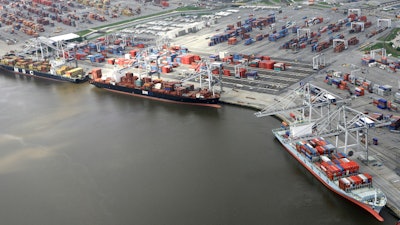
SAVANNAH, Ga. (AP) — The Port of Savannah plans to expand its reach beyond the Southeast and into the Midwest with a $128 million rail terminal designed for larger trains to carry cargo to U.S. cities as distant as Chicago, the chief executive of Georgia's seaports said Thursday.
Griff Lynch, executive director of the Georgia Ports Authority, said the expanded rail facility will take advantage of larger ships arriving via the recently expanded Panama Canal to allow Savannah to compete for cargo that now moves through ports on the West Coast.
"We're going West," Lynch told a packed ballroom of Savannah business leaders during the annual "State of the Ports" speech. "Our goal is to service Atlanta, Memphis, St. Louis, Chicago and the Ohio Valley as a first port of call better than any other port on the East Coast, for sure, and drive business from the West Coast to the East Coast."
Dredging began a year ago to deepen the Savannah River channel linking the port to the Atlantic Ocean to make more room for the giant ships that began to use the Panama Canal this summer. The Savannah harbor expansion should be done in 2020.
Meanwhile, Georgia port officials within the next three-and-a-half years hope to complete a makeover of the Savannah port's two rail terminals used for moving cargo containers between trains and ships at the dock.
Lynch said the existing terminals will be combined and expanded to double their capacity from moving 500,000 container units each year to 1 million units. There will also be room for assembling trains up to 10,000 feet long. "With that massive facility, we change the whole game," Lynch said.
Savannah is the fourth-busiest U.S. container port, and is No. 2 on the East Coast behind only the Port of New York and New Jersey. For both fiscal year 2015 and 2016, the Savannah port moved more than 3.6 million container units.
Savannah has already had some success winning business that once belonged to West Coast competitors such as Los Angeles. The Port of Savannah saw its container business jump a whopping 17 percent last year, in large part because a labor dispute affecting West Coast ports caused cargo to be diverted to the East Coast.
The Georgia Ports Authority says Savannah kept 24 percent of that new business even after ports resumed normal operations on the West Coast.






















